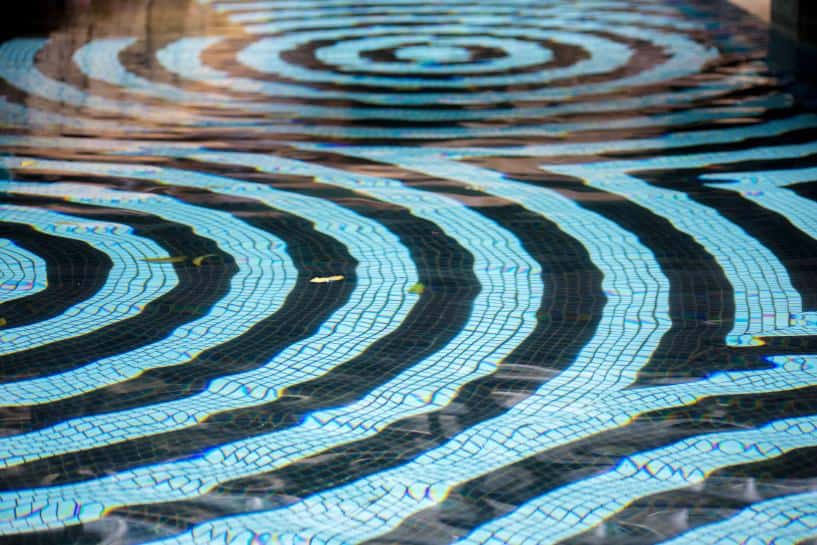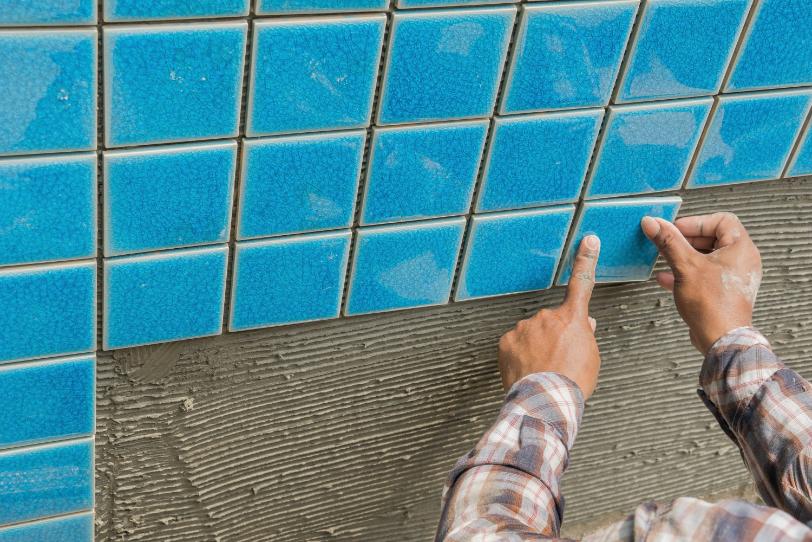Balancing Function and Beauty with Pool Tile Choices
The right choice of pool tiles will transform ordinary swimming pools into stunning artistic showcases while still serving functional roles. Beyond their obvious aesthetic appeal, tiles protect pool structures, provide safety through texture, and withstand years of chemical exposure and extreme temperatures. For Middle Eastern pool owners, selecting the right tiles becomes even more crucial as intense heat and harsh UV exposure demand materials that perform under the extreme elements.
Modern pool tile choices have evolved dramatically from the classic blue and white ceramic squares that dominated pools for decades. Today’s options span luxury glass mosaics that shimmer and shine to natural stone that mimics resorts. Understanding both the practical and visual aspects helps homeowners make decisions that enhance their pools for years to come.
Types of Pool Tiles

Ceramic tiles remain the most popular choice for good reason. These affordable, versatile options handle Middle Eastern heat while offering countless design possibilities. Standard ceramic withstands pool chemicals effectively, reduces installation stress on pool structures, and makes for straightforward replacement.
Porcelain tiles provide extensive durability. Dense and non-porous, they resist chemical damage better than ceramic while maintaining color stability under intense UV exposure. Though slightly expensive initially, their longevity justifies the investment.
Glass tiles are the ultimate luxury statement. These premium options reflect light beautifully, making pools appear larger and more inviting. Their smooth surface resists staining and algae buildup while creating stunning visual effects as sunlight plays across the water. However, glass requires careful handling during installation and costs significantly more than the alternatives.
Natural stone has a wonderful natural charm, but demands careful consideration. These materials need regular maintenance to prevent staining and ensure longevity in chlorinated environments, despite delivering on the aesthetics.
Mosaic tiles offer unmatched artistic flexibility. Small format pieces allow intricate patterns and smooth curves impossible with larger tiles. They work exceptionally well for waterline applications and accent borders, though installation requires skilled craftsmanship.
Functional Considerations When Choosing Pool Tile
Safety considerations start with slip resistance. Textured surfaces provide better grip for swimmers entering and exiting, particularly important around steps and shallow areas. However, overly rough textures trap dirt and algae, creating maintenance challenges. Balancing durability is also important for high-traffic areas.
Tiles must also withstand pH fluctuations and sanitizer exposure without degrading or discoloring. Glazed ceramic and porcelain excel here, while natural stone requires protective sealers that need regular reapplication. Then there is thermal expansion to consider, especially in desert climates with weather that can fluctuate dramatically.
Finally, maintenance requirements vary dramatically between materials. Smooth glass and glazed surfaces clean easily with standard pool brushes, while textured natural stone may require specialized cleaning products. It’s important to consider long-term upkeep costs when making initial selections.
Pool Tile Patterns That Transform Spaces
As we discuss pool tile choices, it’s important to remember that a pool can utilize multiple different types of tile depending on their function. For example, waterline tiles set your pool’s visual tone while enduring constant exposure, which might suit glass tiles. Similarly, classic tiles in complementary colors on the bottom of the pool create timeless appeal, while contrasting borders define the space.
When considering the artistic side of pool design, consider the pool’s shape and where it will be located in relation to the house or main area. After all, a mosaic design is only worth the money if people can see it and appreciate it.
Installation and Maintenance Essentials

Tile installation may even be more important than what type of tile is best for swimming pools, as steps like proper substrate preparation and waterproofing prevent the tiles from failing. Make sure to use specialized pool grouts that resist chemical damage better than standard options, and to use epoxy grouts that offer superior performance.
All that said, long-term care also hinges on proper water chemistry. Balanced pH and alkalinity prevent tile damage while proper sanitizer levels inhibit algae growth. Regular cleaning with appropriate tools and products maintains appearance without damaging surfaces. Most pool owners rely on scheduled professional maintenance to keep the pool clean and help identify potential problems early.
Trust in Pools & Courts for Exceptional Tile Work
Working with experienced installers like Pools & Courts proves invaluable for complex projects with intricate tile work. Proper tile layout, adhesive selection, and installation techniques require specialized knowledge, and mistakes made during installation will endure expensive repairs and maintenance headaches years down the line.
Ultimately, successful pool tile selection balances aesthetic preferences with practical climate demands and proper pool maintenance. Whether choosing a pool builder in Saudi Arabia, proper partnerships determine long-term satisfaction. For top guidance on pool tile choices suited to your needs, consult with specialists like Pools & Courts.

